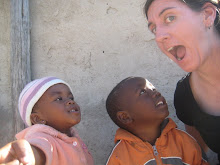When you're in the village, you're really in the village. It's the truth. If I didn't buy a data bundle through my SIM card for my internet phone every month... I would be cut off from all the happenin's in the world. I don't have a TV. The newspaper that's sold everyday in the Taposa Bakery parking lot is South Africa's equivalent of The National Inquirer or News of the Weird.
The whole time I've been here I've heard bits and pieces of news about Zimbabwe thrown around the village. People refer to Mugabe. Some people are angry with all the people who have crossed the border seeking basic necessities. Some people feel that all the refugees are taking away jobs and services meant for South Africans. Some people shake their heads in sympathy, empathy, shame, at what's happening in the country just north of us that has collapsed and deflated. Back in early December I got an SMS (text) from Abby. "The Limpopo has The Cholera, Be Careful!". That was the first sign that I knew something was a little off up in these parts. Yes, it's true. The Limpopo River, the natural border between Zim and South Africa, has tested positive for Cholera. Thousands of people are sick. Several thousand have died... and the epidemic has crossed country borders... spreading into Botswana, South Africa, and Mozambique. Although I have yet to hear of any people within my community being sick... I have heard that some water supplies very near here have tested positive (this is all hearsay). I'm going to the local hospital this week to see what I can find out. My family is fine, our drinking water is rainwater from the tank, and I'm boiling and filtering.
For now, I'm going to post some links to a few articles I found on the World Health Organization (WHO) website and the one for Doctors Without Borders/ Medecins Sans Frontieres.
"Cholera is an acute intestinal infection caused by ingestion of food or water contaminated with the bacterium Vibrio cholerae. It has a short incubation period and produces an enterotoxin that causes a copious, painless, watery diarrhoea that can quickly lead to severe dehydration and death if treatment is not promptly given. Vomiting also occurs in most patients.
Most persons infected with V. cholerae do not become ill, although the bacterium is present in their faeces for 7-14 days. When illness does occur, about 80-90% of episodes are of mild or moderate severity and are difficult to distinguish clinically from other types of acute diarrhoea. Less than 20% of ill persons develop typical cholera with signs of moderate or severe dehydration.
Cholera remains a global threat and is one of the key indicators of social development. While the disease no longer poses a threat to countries with minimum standards of hygiene, it remains a challenge to countries where access to safe drinking water and adequate sanitation cannot be guaranteed. Almost every developing country faces cholera outbreaks or the threat of a cholera epidemic."- http://www.who.int/topics/cholera/en/
A 02 December article from the WHO website:
http://www.who.int/csr/don/2008_12_02/en/index.html
A 30 January 2009 article from the WHO website that covers what is needed to control the Cholera outbreak in Zim:
http://www.who.int/mediacentre/news/releases/2009/cholera_zim_20090130/en/index.html
A 30 January 2009 article from the MSF website, includes latest numbers and challenges:
http://www.doctorswithoutborders.org/news/article.cfm?id=3383&cat=field-news&ref=home-center
A 03 February 2009, personal account from a MSF employee:
http://www.msf.org/msfinternational/invoke.cfm?component=article&objectid=3747FDEF-15C5-F00A-2574AB953724495B&method=full_html
08 February 2009
Subscribe to:
Post Comments (Atom)


1 comment:
Something so tiny (the bacteria) can wreak havoc on such a large population. I am so glad you are doing the proper things for your drinking water!
I am starting a letter, BTW!!
Post a Comment